
- 05-05-2024 -
 The Sixth Sunday of Easter
The Sixth Sunday of Easter
Gospel Text: John 15:9-17
vs.9 Jesus said to his disciples:
"As the Father has loved me, so I have loved you. Remain in my love.
vs.10 If you keep my commandments you will remain in my love, just as I have kept my Father's commandments and remain in his love.
vs.11 I have told you this so that my own joy may be in you and your joy be complete.
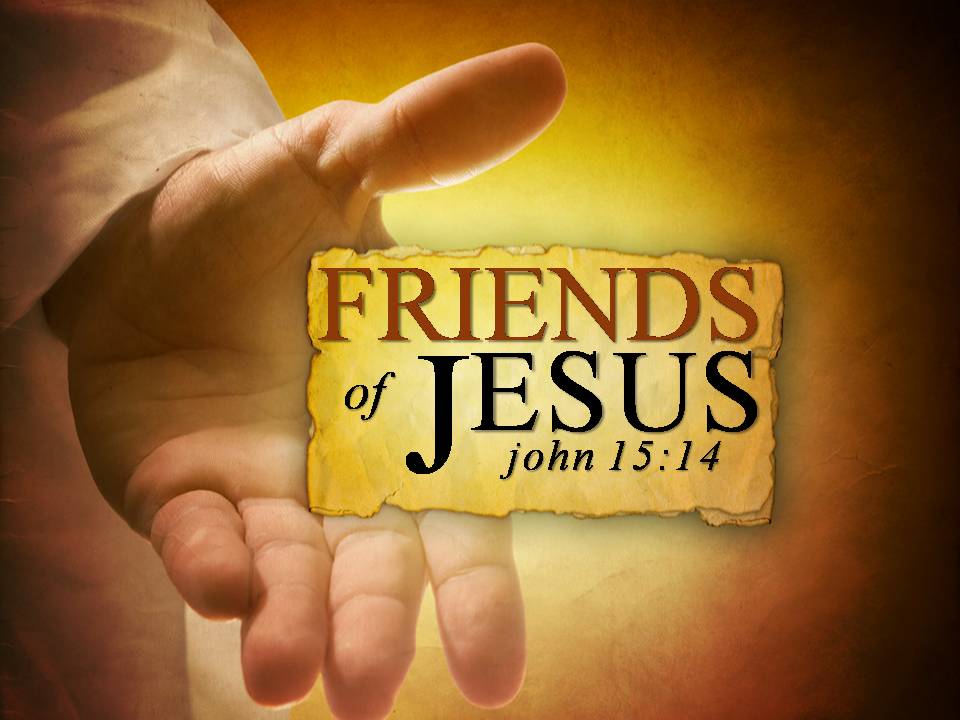 vs.12 This is my commandment: love one another, as I have loved you.
vs.12 This is my commandment: love one another, as I have loved you.
vs.13 A man can have no greater love than to lay down his life for his friends.
vs.14 You are my friends, if you do what I command you.
vs.15 I shall not call you servants any more, because a servant does not know his master's business: I call you friends, because I have made known to you everything I have learnt from my Father.
vs.16 You did not choose me, no, I chose you; and I commissioned you to go out and to bear fruit, fruit that will last; and then the Father will give you anything you ask him in my name.
vs.17 What I command you is to love one another."
******************************************
We have four commentators available from whom you may wish to choose .
Click on the name of the commentator required.
****************************************
Michel DeVerteuil
Lectio Divina with the Sunday Gospels
www.columba.ie
General Comments
Today's passage follows directly on last Sunday's. The metaphors however are not as dramatic. We must therefore make an effort to use our imagination in reading and eventually in interpreting them.
- Verse 9 provides us with the key to the whole passage. We must therefore give it all our attention. The rest of the passage will then illustrate some aspect of it.
This passage is giving us one message - we come to others with a love which we ourselves have experienced from others. This is telling us two important things.
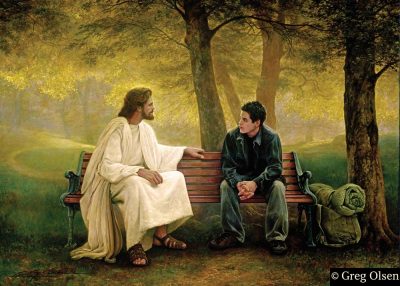 - The first is that we love others from something we feel in ourselves. There are people outside ourselves whom we love. It isn't something we do because we have been ordered to do;
- The first is that we love others from something we feel in ourselves. There are people outside ourselves whom we love. It isn't something we do because we have been ordered to do;
we just feel it and then act accordingly.
- On the other hand, the love we feel for others has come from somewhere else. It was placed within us by those who loved us first. When we love nowadays therefore, we are re-enacting something we have inherited from others. It did not come only from us.
We need to spend some time meditating on these two facts. Once we get them right, we will be able to decide how to prolong our desire to love - the love we have within us and which we have to practice on the others we meet in the course of our lives.
 The term "love" is over-used, both in our sacred language and in our secular language. The love we speak about therefore tends to remain abstract. In interpreting a passage like this one then, we must link it to a personal memory. We have to remember some act of love which touched us very deeply.
The term "love" is over-used, both in our sacred language and in our secular language. The love we speak about therefore tends to remain abstract. In interpreting a passage like this one then, we must link it to a personal memory. We have to remember some act of love which touched us very deeply.
We remember something a person said to us or allowed to happen to us. They would be saying something like:
I am suffering this for you now and I am doing it so that you too can be of service to others when your turn comes. When the person told us this, it made a very deep impression on us.
Ever afterwards we would always return to it and remember what it meant to us. We know that we can now suffer for others because this other person suffered with us. They were helping us to lift others and because of that, we now know what we must go through so that others will feel safe with us. We think of that as we bring up our children and all those whom the Lord has entrusted to our care.
Through this memory, we know that when we are deeply loved we do not have to be enslaved to those who loved us. We know we can trust them. It will naturally be someone who was or eventually became very important for us. Perhaps one of our parents, an uncle or aunt, a brother or sister. It could also be someone who later became a deep friend. We remember too other people who loved us sincerely in our lives - a teacher, a friend, a fellow parishoner, someone we met on our life journey.
We can also apply the passage to our relationship with the wider world. In all the great trouble spots of the world there are always people who spend a lot of their time working for peace between warring factions. This has happened in areas like Palestine, Iraq, Northern Ireland, the Basque Countries and S.Africa. They don't make the news headlines but they are really there and as we read this passage we are with them within our hearts.
Jesus does a very interesting thing then. He says, "As the Father has loved me, so I have loved you." This is telling us that we give ourselves to others in the same way that others have given themselves to us. This is very true, isn't it? Once we love others we find that we can share with them the truth of who we really are.
- Verse 10 takes us a little further. It invites us to move in a new direction, as Jesus makes the connection between "keeping commandments" and "remaining in his love". This is telling us something important about "commandments". In this passage they do not refer to a series of obligations. They are rather a general commandment to accept what the other person is doing for us. Keeping his Father's commandments means simply that Jesus can remain calm within the awareness of his Father's love.
- Verse 11 brings in the theme of joy. This is a new development again. All love produces joy. It is like an unnamed corollary of giving one's life to others. If our love doesn't produce joy, it can't be right. We have to add something to it which we may have neglected.
- Verse 12 starts by repeating the connection that was made earlier,
"This is my commandment, love one another as I have loved you". The Christian commandment to love is based on Jesus' love for us. We love not merely from ourselves but because the love of Christ has taken charge of us.
- Verses 13-15. Jesus then goes on to make the connection between love and the relationship between friends. He goes to the heart of what being a friend is all about. It means seeing another in the light of our experience.
"A servant does not know his master's business, but I have made known to you everything I learnt from my Father." Let us spend some time with these imposing words. We take what we can from them and then let them take charge of us.
- Verse 16a stays with friendship and goes back to the theme of bearing fruit which we saw last Sunday. It stresses first the choice of the person who wants to make us his friends - "You did not choose me, no I chose you". This is so important. We often act as if we are the ones responsible for loving others. We do not really chose the person we decide to love. It is God who chooses us to reach out to them. We must be aware of this fact and respond accordingly.
Then Jesus gives an important lesson. "I commissioned you" means first that he has sent us out and that we are to go out and bring forth results. The results are simply "to bear fruit", to show the world what our love has accomplished. Then he adds another important corollary, "the kind of fruit that I know will last." It must not be a fruit that no one can understand or accept. It must the kind that we know will last.
- Verse 16b. Then Jesus makes a very important point. "The Father will give you anything you ask him in my name". The Father in heaven will therefore give honour to all those who bear the name of Jesus, written in their hearts.
- Verse 17 is the climax, striking in its simplicity. When all is said and done, what really counts in life is the principle of love. Once we know how to love, we will have kept all the Lord's commandments.
Prayer Reflection
"Spiritual poverty clings to nothing and nothing clings to it." ....Meister Eckhart
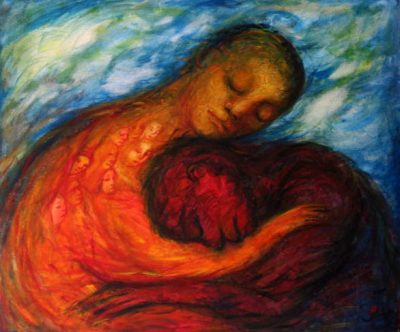 Lord, forgive us that we are so busy when we come into your presence.
Lord, forgive us that we are so busy when we come into your presence.
*We have to tell you all our needs in case you might forget some of them.
*We make many resolutions in case you don't think well of us.
*We are anxious to get some teaching from you that will keep us faithful to your will.
*We thank you for the times when you invited us just to be quiet and remain in your love, your permanent unconditional love, the kind you had from your Father.
"Prayer is not meant to change the world. It is meant to change us so that we will then change the world." ...Sr Joan Chittister
Lord, we have made the commandments into cold, objective obligations
and many of them, at that.
We thank you that they are gestures of love
*the tender embrace between husband and wife before leaving for work,
* the words of wisdom that a great leader speaks to his intimate followers on his deathbed,
* the wave of friends at the airport.
*They are all gestures that we treasure
because they tell us that we are loved
and set us free to give ourselves to others.
Lord, when we look at our lives we discover a history of love.
We were loved when we were small, as Jesus was loved by Joseph and Mary.
And that love freed us;
it was a starting point from which we could trust others and give ourselves to them.
And now our children, those whom we have loved in our turn, have grown up and become loving people too.
Lord, that history of love is your presence in the world.
"Be as uninteresting as a glass of cold, clear, uninteresting water." ... Aidan Kavanagh
Lord, we thank you for our friends.
We remember when we knew them first.
We admired them so much that we just wanted to please them,
not really to understand them - just like servants.
Then gradually we became friends, as we learnt to trust each other,
to let ourselves be known so that we could share what was most intimate to us,
the kind of things only you taught us,
and there was no such thing as "this is my business".
The interesting thing is that we have come close to you too.
"Baby, will you remember me when you wake on Ash Wednesday morning? You know how it is always a different story." .... David Rudder , Calypsonian
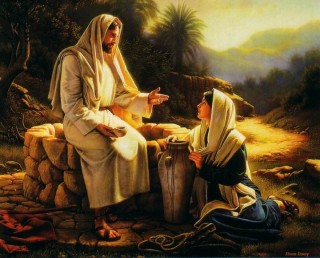 Lord, the ideal for great people today seems to be that they give orders and demand obedience. We have those who know and then the rest who know nothing.
Lord, the ideal for great people today seems to be that they give orders and demand obedience. We have those who know and then the rest who know nothing.
We thank you for Jesus and those who follow his style, who look on their followers as friends
and make known to them their dreams for themselves and for the world.
Only they can bring about true community.
Lord, we thank you for the joy of married love, when you don't have to prove yourself or try to be different but can just relax in someone's love.
Truly that is a joy that is complete.
"Be men and women of the world but not worldly men and women." ...Anonymous
Lord, we sometimes act as if our plans for society are our own and we must destroy all who oppose us. But the hopes we have for the Church, for our country, for the world, are your gift to us, the passion we feel is your doing.
We are your servants sent to carry out your commission, and our achievements are the fruit you cause to emerge.
So even if we die before we achieve what we set out to do, and even if our successes are short-lived, the fruit we bear will endure because they come from you.
"If you love God, the pain does not go away, but you live more fully." ... Michael Hollings
Lord, we thank you for those precious moments
when we know that your command to love, though very simple, was all that we needed. It summed up the law of life, the secret of peace and prosperity,
and the only hope for the world.
***********************************
Thomas O'Loughlin
Liturgical Resources for the Year of Matthew
www.columba.ie
Introduction to the Celebration
We are the people who live in Christ's love: by dying he has destroyed our death, by rising he has restored our life, and we look for him to come in glory. So now let us celebrate his presence among us.
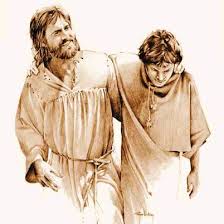 Set at the heart of the Last Supper discourse, todays Gospel passage restates, yet again, the new commandment of love, and establishes the nature of the bond between those celebrating the Eucharist in Johannine communities: they can be seen as friends of the Word. The intimacy implied in friendship in the ancient world is something that is lost on us today, but it was used to describe the highest level of human intimacy.
Set at the heart of the Last Supper discourse, todays Gospel passage restates, yet again, the new commandment of love, and establishes the nature of the bond between those celebrating the Eucharist in Johannine communities: they can be seen as friends of the Word. The intimacy implied in friendship in the ancient world is something that is lost on us today, but it was used to describe the highest level of human intimacy.
Homily Notes
1. Finding suitable ways to give a broad overview catechesis of what we believe in by saying Jesus rose from the dead and has shared his new life with us is something that has concerned preachers from the very beginning as we can witness, for example, in 1 Peter. What is needed is a rounded statement, that is accessible, memorable, and pictorial.
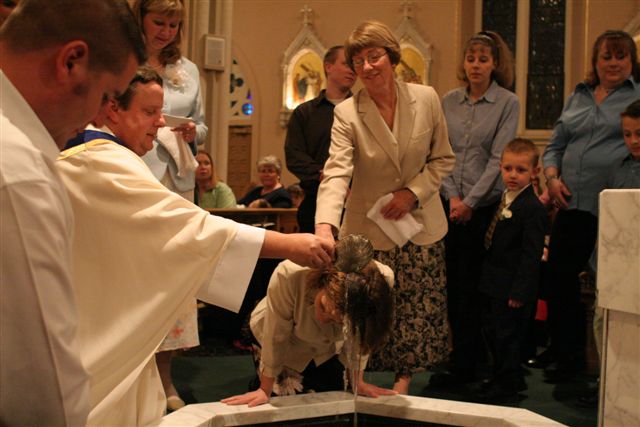 The most frequently chosen image has been that of baptism – but while this is the foundational Christian symbol, its power for many today is limited as it is too often seen just as a family occasion or as rite for infancy. So even when we preach about it, we have to face the dissonance that an actual baptism may for those concerned involve more worry over the name to give the child than the ritual or its reality.
The most frequently chosen image has been that of baptism – but while this is the foundational Christian symbol, its power for many today is limited as it is too often seen just as a family occasion or as rite for infancy. So even when we preach about it, we have to face the dissonance that an actual baptism may for those concerned involve more worry over the name to give the child than the ritual or its reality.
2. However, we must still use our great symbols and continue to expound them. One way of doing this is to take the prayer for the blessing of the water at baptism at the Easter Vigil (Missal, pp. 213-214) and go through it by way of a meditation with comments. This serves to recall that we are in Eastertide and calls up all the great images of Christian memory.
***********************************
Sean Goan
Let the reader understand
www.columba.ie
Gospel: John 15:9-17
These verses continue the text from last Sunday and tease out the implications of the vine symbolism and what it means to abide or remain in Jesus. The underlying reasoning is simply this: everything arises out of the loving relationship between Jesus and the Father.
 Throughout his life Jesus is responding to the Father's love and making it known.
Throughout his life Jesus is responding to the Father's love and making it known.
As the disciples come to faith in Jesus they are being drawn into that loving relationship and they too can share the joy that enthuses Jesus and inspires him to reveal his Father to the world.
The one sure way of knowing that their faith is true is their love for one another. Just as Jesus was prepared to lay down his life for them, so too must they be willing to live in humble service of one another.
Reflection
The gospel and letters of John were probably written around 100 AD and were among the last parts of the New Testament to be penned. It is as though the prayer and reflection of the first generations of believers finally brought them to an understanding of what the whole Christian experience was all about and it could be summed up in three simple words: God is Love. This is neither pious sentimentality nor a bland cliche for, if it is taken seriously, nothing can ever be the same again. Peter and Cornelius both discovered that this is a love that makes changes and shatters old certainties. This is the love which proves that God will stop at nothing to convince a weak and wounded humanity of its immeasurable worth and dignity. The sad thing is that we often still choose to live in the darkness surrounded by our prejudice and fear. Or worse still, we imagine that being a follower of Jesus is about intellectual adherence to dogmas rather than a living out of a relationship of love.
****************************
Donal Neary SJ
Gospel Reflections
www.messenger.ie/bookshop
The One Commandment – Only One
This gospel is like a vision statement or a mission statement from Jesus. About finding joy in listening to Jesus, how to live the good life in love one another, how to love oneself in the love of God, and in directing our lives to bear fruit that will generate love.
 It is so central that it is read at many really important moments of a Christian life. it is one of the most popular readings at a wedding, linking the love of God and human love at such a special time.
It is so central that it is read at many really important moments of a Christian life. it is one of the most popular readings at a wedding, linking the love of God and human love at such a special time.
Jesus’ love was to lay down his life. in a specific way. Our love lays down our life often in small, unforgotten ways.
*Hours spend with a sick child or parent,
*years caring for someone ill,
*leaving home on missionary assignments;
*giving up something for the children.
*Working for peace/justice for the needy
The message is a big challenge in simple ways for most of us.
Isn’t it a joy to know that the most enjoyable mystery of life – love, is the only commandment of God? This shows us that God is on our side: His commandment is to do what we want most to do and experience – to love and be loved. Even when the love costs us something.
Recall a time when you felt you were really loving someone.
Become aware that you were then very near to God.
Thank you, Lord, for love given and received in my life.
********************************